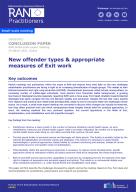Details
- Publication date
- 9 June 2021
- Author
- Directorate-General for Migration and Home Affairs
- RAN Publications Topic
- Rehabilitation
Description
Recent meetings and publications within the scope of RAN and beyond have shed light on the new challenges rehabilitation practitioners are facing in light of an increasing diversification of target groups. This relates to both Islamist extremism and right-wing extremism (IE/RWE). Developments previously noted include, among others, an increasing number of middle-aged individuals, more persons from financially stable backgrounds, a growing blurriness of ideological bounds (especially regarding RWE) and a move away from Salafi-jihadism towards Islamist ideologies that easily navigate the fine line between legality and extremism.
Despite the fact that many experts from research and practice have noted these developments, ideas on how to overcome these new challenges remain scarce. As a result, a small-scale expert meeting was convened to discuss which changes can actually be observed, how they affect practical work and which consequences these insights should entail for practical approaches. In short, the meeting explored this very pertinent question: Are current approaches in the fields of Exit, deradicalisation, and rehabilitation work still impactful enough?
Key findings from the meeting:
- Practitioners observe a stark growth in the number of persons exhibiting mental health issues. As such, rehabilitation measures and mental health support need to be better integrated. Be mindful not to stigmatise mental health issues when doing so, but rather promote their positive role and value.
- The fast-paced fluidity of extremist scenes and ideologies will likely persist. This fluidity is partially fuelled by the internet-led globalisation of extremist scenes and ideologies. This means it is necessary to apply flexible methodologies in practical approaches, ideally fuelled by constant monitoring and analysis, instead of narrow approaches bound to one specific notion of radicalisation.
- While flexibility within the overarching programmes is necessary to capture recent developments, specific approaches aimed at radicalised military and police personnel need to be integrated into these programmes.
- Both IE and RWE scenes improve their capabilities to avoid bans by navigating the fine line between their legal right to freedom of expression and extremist speech and actions. This results in a controversial debate over what constitutes extremism, i.e. when should P/CVE and rehabilitation work begin.
This paper will first describe the challenges discussed by experts during the meeting. Based on this, first ideas and recommendation for practitioners, policymakers and research are presented.

